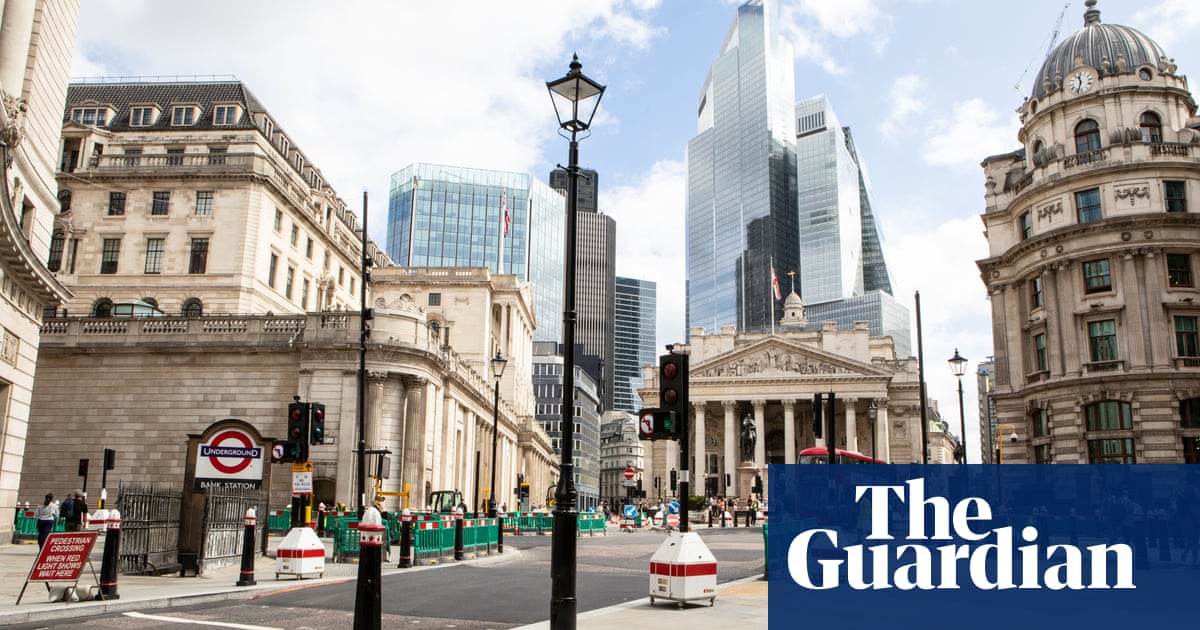Signs of returning UK inflation give Bank of England interest rate dilemma

The Bank of England is facing a dilemma amid signs of returning inflationary pressures even as businesses cut jobs at the fastest rate in four years in the wake of Rachel Reeves’s autumn budget.
Before a crunch interest rate decision on 6 February, an influential business survey showed economic growth picked up slightly at the start of 2025 led by Britain’s dominant service sector.
However, the flash purchasing managers’ index (PMI) for January from S&P Global, which is closely monitored by the Bank and the Treasury, signalled the average prices charged by UK private sector firms are rising at their fastest pace for 18 months.
Employers also cut jobs at the fastest pace since the height of the Covid pandemic in 2021. Excluding the health emergency, the rate of job-cutting was the highest since the global financial crisis in 2009.
Adding to the pressure on Labour after a challenging start to the year marked by turbulence in financial markets, separate figures showed retail sales continued to fall in January after a disappointing Christmas, and consumer confidence fell to the lowest level since late 2023.
“Inflation is turning higher again, presenting the Bank of England with a policy dilemma,” said Chris Williamson, the chief business economist at S&P. He added that the UK was facing a “stagflationary environment”, in which anaemic economic growth is coupled with high inflation.
“While the stalled economy and deteriorating jobs market suggest there’s an increased need for rate cuts to stimulate growth, the rise in price pressures hints that the inflation genie is by no means back in its bottle,” he said.
City investors expect the Bank to cut interest rates from the current level of 4.75% at its next policy meeting on 6 February after better-than-expected inflation figures for December and amid concerns over stagnant economic growth.
Financial markets reflect an 81% chance of a cut to 4.5%. However, City traders warned the central bank’s capacity to cut borrowing costs much further is likely to be limited by rising inflationary pressures. Investors are pricing in two full 0.25 percentage point rate cuts in 2025.
Inflation has fallen back from a peak of more than 11% in the second half of 2022, after Russia’s invasion of Ukraine triggered a rise in energy prices. But while it briefly fell below the Bank’s 2% target last autumn, it has risen to 2.5%, while investors predict it could surpass 3% within months.
Mark Dowding, the chief investment officer at RBC BlueBay Asset Management, said: “It seems very likely that the Bank of England will use any opportunity it can to lower interest rates and, in that context, it is expected to cut rates to 4.5% in February.
“However, [we continue] to see inflation remaining stubbornly around 3.5-4%, which means that we struggle to see [Andrew] Bailey being able to lower rates much further than this.”
The preliminary “flash” reading of the UK composite PMI edged higher to 50.9 in January, a three-month high, up from 50.4 in December. A reading of 50.0 separates growth in private sector activity from contraction.
after newsletter promotion
Analysts warned inflation was predicted to rise after an increase in the Ofgem energy price cap in January, with a further increase expected in April. Goods price inflation is also rising, while wholesale food prices have also risen in recent months.
Businesses have also warned they will either cut jobs or raise their prices after Reeves’s October budget included a £25bn increase in employer national insurance contributions and a 6.7% rise in the minimum wage.
Begbies Traynor, an insolvency specialist, said it had recorded a 50% increase in the number of UK companies on the brink of collapse in the final three months of 2024 from the previous quarter. It said 46,850 businesses were in “critical” financial distress, with consumer-facing sectors such as hotels, leisure and retailers particularly under pressure.
The chancellor has sought to restate Labour’s commitment to growing the UK economy in the past week with a flurry of pro-business pledges at the World Economic Forum in Davos. Reeves is also expected to go further, and a speech is pencilled in for next week.
Separate figures from the CBI lobby group showed year-on-year retail sales volumes fell in January, while the closely-watched GfK consumer confidence index dropped to the lowest level since late 2023.
Martin Sartorius, the principal economist at the CBI, said: “With recent growth figures showing the urgent need to inject momentum into the economy, the government should look at policy levers that would help shore up confidence across key sectors, including retail.”
Related
Why investing in women is a vital next step for…
Get Nadine White's Race Report newsletter for a fresh perspective on the week's newsGet our free newsletter from The Independent's Race CorrespondentGet our fre
Business secretary signals major shift on electric car policy to…
In a determined effort to retain Nissan’s manufacturing presence in Britain, Business Secretary Jonathan Reynolds has vowed to implement “substantial c
Joint Statement: Business Secretary and Fujitsu Services Ltd
Business and Trade Secretary Jonathan Reynolds today (Friday 7 March) met chiefs for Fujitsu in Tokyo to begin talks over the cost of redress for victims of th
UK foreign secretary backs multilateral defence funding for Europe
UK foreign secretary David Lammy has said that a new multilateral fund will be needed to secure Europe’s defence as he confirmed that Britain is “open to”













